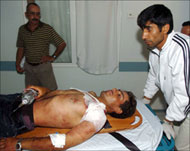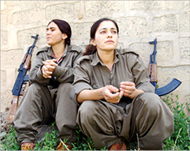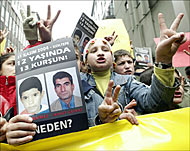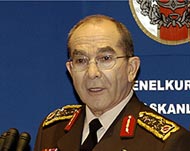Turmoil revisiting southeastern Turkey
After years of relative calm, Turkey’s southeastern region is once again witnessing armed clashes between soldiers and ethnic Kurdish rebels.

In the past month, 20 Turkish soldiers have been killed in the region by mines or in ambushes, while the military has conducted operations against the rebels of the Kurdish Workers Party (PKK) involving up to 10,000 troops.
The PKK says it is fighting for autonomy and greater rights for Turkey’s estimated 12 million ethnic Kurdish population, who mainly come from the southeastern region.
Violent upsurge
In the latest attacks, a leading former ethnic Kurdish politician was assassinated outside his house in Diyarbakir, while a bomb planted by a splinter Kurdish group wounded 20 people in the Aegean resort town of Cesme.
 |
|
Turkish soldiers have been |
Later, the PKK set up a roadblock outside the southeastern town of Tunceli, taking a Turkish soldier prisoner and holding up 40 vehicles.
A 1000-soldier strong hunt by the Turkish military for the prisoner and his captors then got under way, as Turkish Land Forces Commander General Yasar Buyukanit told reporters: “Our struggle against terrorism continues.”
The authorities have always regarded the PKK as a terrorist organisation, as do the EU and the US. As such, it cannot be negotiated with.
“The terrorist threat is even more serious now,” Buyukanit told the press back in May. “Terrorists are infiltrating into the country.”
This was a reference to the PKK’s bases next door in northern Iraq – territory nominally under the control of the US-backed Baghdad government.
Huseyin Atay, an executive officer of the recently founded Democratic Society Movement (DTH), a political party based largely among Turkey’s estimated 12 million ethnic Kurds, said: “The war has begun to explode here.”
Ceasefire abandoned
The fighting has returned after the PKK abandoned its unilateral ceasefire last year.
 |
|
The PKK says it is fighting for |
The ceasefire had been declared in September 1999. At that point, the group had been fighting for 15 years with Turkish forces, a struggle that had left an unknown number of dead, but which most put at between 30,000 and 40,000 people, mostly ethnic Kurds.
Now, many in the region are worried that the bad days of the 1980s and 1990s are returning.
“People are very anxious,” says Selahattin Demirtas, chair of the Diyarbakir Human Rights Association (IHD). “They are afraid that the killing will go on like before.”
Many in the region are also disappointed and angry that while the PKK declared a ceasefire for more than five years, the authorities did not do likewise.
“Six years ago, the guerrillas wanted peace, but in this period, a lot of them were killed. They didn’t attack, but the soldiers attacked them,” says Atay.
Deep wounds
The fighting has left the region deeply scarred.
According to the IHD, 3500 villages and hamlets were forcibly evacuated by the military during the 1980s and 1990s, while hundreds of local people simply disappeared. The region’s economy was also shattered.
“In this area,” says Celal Balik of the southeastern region’s businessmen’s association Gunsiad, “unemployment is around 40%, according to official statistics. I think in reality it is much higher.”
 |
|
The Kurdish language is banned |
In Turkey as a whole, the unemployment rate is around 12%.
“Every year in the region, 800,000 kids graduate from high school. Half of them have no work to go to,” Balik continues.
Gunsiad also complains that despite many representations to the government in Ankara over the past few years, little has been done to help the region.
“They say ‘yes, yes’ but then do nothing,” Balik says.
Rights abuses
There are also widespread complaints of human rights abuses by the authorities, and claims that the justice system often turns a blind eye to these.
“We have discovered many corpses, skeletons,” IHD’s Demirtas says.
“But the public prosecutor does not accept the cases and investigate them. Instead, over the last two years, the prosecutors have filed 65 cases against me personally for informing the press about all this.”
In its 19-year history, 14 people working for the IHD have themselves been the victims of assassination by unknown assailants.
EU pressure
However, the Turkish authorities point to a number of reforms instituted by the present government to ease previous restrictions on the country’s ethnic Kurdish community.
 |
|
Many believe the military is the |
Many of these changes have also come as a result of pressure from the European Union, which Turkey wishes to join. Top DTH politician Leyla Zana was released from prison last year after a long campaign by rights advocates and the EU.
She had originally been jailed for addressing parliament in Kurdish – the language has long been banned from the public domain.
Yet last year, broadcasts in the Kurdish language were brought in on the state TV station, while the teaching of Kurdish has also been allowed in private language schools.
The state has also invested a great deal in a massive hydroelectric and irrigation project in the region over the last 20 years, know as the GAP project.
Yet on the streets of Diyarbakir and other southeastern towns, many complain that the government’s easing of restrictions has not really touched their lives.
Language ban
“Why would I want to go to a private language school and pay to learn Kurdish?” asks Musa Birgin, a cafe owner in Hasnakeyif, a town east of Diyarbakir on the Tigris River.
“It’s my mother tongue. I already speak it. What we want is not this, but that our children are taught in their mother tongue at school.”
Kurdish is, however, still banned from state school classrooms. Equally, it is also banned from public and political speeches.
|
“It’s very simple. I am a Kurd. Almost everyone here is a Kurd. We just want them to recognise that” Cafe owner Musa Birgin |
“We want people to be able to express themselves,” says Atay. “We are against all kinds of violence and want to talk and discuss all this with the government. But they don’t want to talk.”
Disagreement has also split ethnic Kurdish groups including the PKK, with Osman Ocalan, the brother of jailed PKK leader Abdullah Ocalan, leaving last year to form a new group, the PPDK, which urges an end to violence.
Meanwhile, the main pro-Kurdish political party in Turkey, the Peoples’ Democracy Party, also saw a split when Atay’s DTH left, led by Zana.
The DTH advocates a more pan-Turkey approach, advocating rights for all ethnic and religious minorities.
Yet as far as many in the region are concerned, all these developments have fallen on deaf ears in Ankara, and among Turkey’s powerful military – whom many see as the real power in the southeast.
“It seems like a complicated problem on the outside, perhaps,” says Birgin. “But really, it’s very simple. I am a Kurd. Almost everyone here is a Kurd. We just want them to recognise that.”
Meanwhile though, the violence continues to escalate.